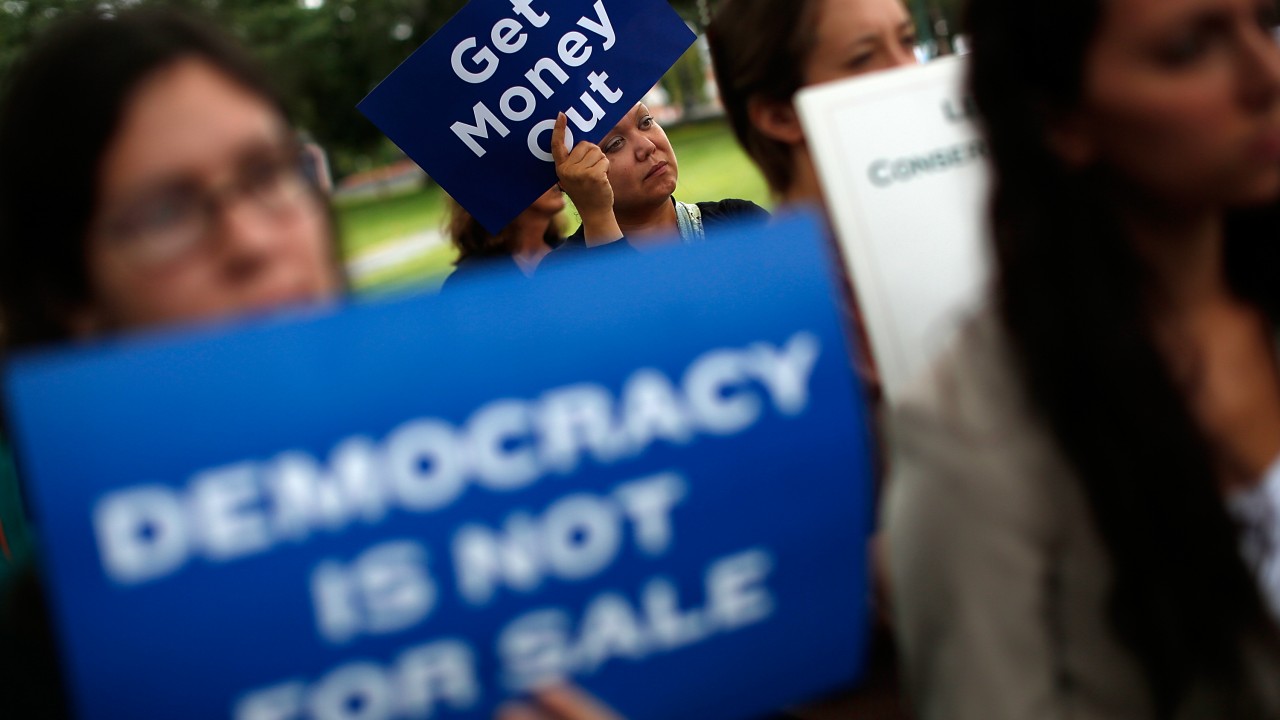
Supporters of campaign finance reform listen as members of Congress discuss a joint resolution proposing an amendment to the Constitution of the United States relating to contributions and expenditures intended to affect elections outside the Capitol, September 8, 2014, in Washington, DC. (Photo by Win McNamee/Getty Images)
This post originally appeared at The Nation.
When Americans cast their ballots for president next November — at the close of what will be the most expensive campaign in the country’s history — voters in the nation’s largest state could weigh in on the question of whether to amend the US Constitution to counter the influence of all that campaign cash.
Sixteen states have already formally requested that members of Congress support an amendment to effectively overturn the US Supreme Court’s 2010 decision in the case of Citizens United v. Federal Elections Commission — the most egregious of a series of High Court rulings that have ushered in a new era of corporate spending and special-interest influence. So, too, have 650 communities across the country, including Los Angeles, the most populous city in California and the second-most-populous city in the United States.
But a vote by Californians in favor of an amendment that would renew the authority of local, state, and federal officials to regulate campaign fundraising and spending has the potential to send the most powerful signal yet in support of the constitutional remedy.
That signal should have been sent in 2014. Unfortunately, the opportunity to express popular support for reform — and to prod Congress to act — was thwarted that year by defenders of the current system.
Legal challenges posed by the conservative Howard Jarvis Taxpayer Association blocked the 2014 vote on the “Overturn Citizens United Act,” which was assigned proposition number 49.
On Monday, however, a 6–1 decision by the California Supreme Court ruled that “Long-standing historical practice among the states demonstrates a common understanding that legislatures may formally consult with and seek nonbinding input from their constituents on matters relevant to the federal constitutional amendment process.”
— Derek Cressman, veteran campaign finance reform activist
This is good news for the fight for reform in California and nationally, as it provides legal justification and support for the use of advisory initiatives and referendums to build popular support for this necessary amendment — and to put pressure on lawmakers to act. With Democratic presidential contenders Hillary Clinton, Bernie Sanders, and Martin O’Malley talking up the idea of an amendment, along with a majority of Democrats in Congress and a growing number of enlightened Republicans, there is momentum for reform.
A call to action from the nation’s largest state — along with signals from other states and communities where groups such as Move to Amend, Free Speech for People, Common Cause, Public Citizen’s Democracy Is For People campaign and People for the American Way are active — could renew and extend that momentum.
“Californians will now have a chance to remind members of Congress who they work for by instructing them to get big money out of politics and to start listening to ordinary voters,” says Derek Cressman, a veteran activist on behalf of campaign finance reform and the author of the book When Money Talks: The High Price of “Free” Speech and the Selling of Democracy.
Cressman has served as manager for the Yes on Prop 49, campaign, which fought the long legal battle to restore the measure to the ballot.
The California Supreme Court ruling was a major victory for the Yes on 49 committee and amendment advocates. But their work is not done. As the committee notes, “the Court did not complete its work. It did not order Prop 49 restored to the November 2016 ballot.”
California Secretary of State Alex Padilla must now determine whether to place the Overturn Citizens United Act on the ballot this year.
“It would be a terrible miscarriage of justice if the people’s decisive victory in the Supreme Court did not result in Prop 49’s being placed before California voters in November 2016,” argues the Yes on 49 committee, which has launched a new campaign to get Padilla to place the measure on the November 2016 ballot. “It was the voices and actions of Californians that convinced the CA Legislature to enact the bill that became Proposition 49. We need your voice to be heard!”
As Michele Sutter, a co-founder of the MOVI (Money Out Voters In) campaign that led the push for the Overturn Citizens United Act in the California Legislature, says, the court has affirmed that “California voters do have the ‘right to instruct their representatives’ to act to end the corruption of our government by corporate monopoly interests and billionaires.”




